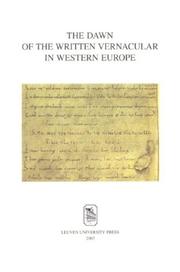| Listing 1 - 4 of 4 |
Sort by
|
Book
ISBN: 9065693416 9789065693419 Year: 1984 Volume: 111 Publisher: Brussel Koninklijke academie voor wetenschappen, letteren en schone kunsten van België
Abstract | Keywords | Export | Availability | Bookmark
 Loading...
Loading...Choose an application
- Reference Manager
- EndNote
- RefWorks (Direct export to RefWorks)
Linguistique --- Discourse analysis --- Grammar, Comparative and general --- 82-34 --- Discourse grammar --- Text grammar --- Semantics --- Semiotics --- 82-34 Sprookje. Legende. Mythe --- Sprookje. Legende. Mythe --- Linguistics --- Philology --- Topic and comment --- Dornröschen. --- Kinder- und Hausmärchen. --- Discourse analysis. --- Topic and comment. --- Contes --- linguistics --- exegesis --- fairy tales --- Grimm [Brothers] --- Sprookjes. Taalwetenschap. --- Contes. Linguistique. --- Linguistique textuelle. --- Teksten. Taalwetenschap.
Book
ISBN: 3447041129 Year: 1998 Volume: 81 Publisher: Wiesbaden Harrassowitz
Abstract | Keywords | Export | Availability | Bookmark
 Loading...
Loading...Choose an application
- Reference Manager
- EndNote
- RefWorks (Direct export to RefWorks)
Book history --- Lexicology. Semantics --- anno 1700-1799 --- anno 1600-1699 --- Europe --- Analyse du discours --- Curiosities and wonders --- Curiosity in literature --- Curiosité dans la littérature --- Curiosités --- Curiosités et merveilles --- Discourse analysis --- Discourse grammar --- Enigmas --- Facts [Miscellaneous ] --- Faits divers --- Merveilles --- Miscellaneous facts --- Mystères et merveilles --- Nieuwsgierigheid in de literatuur --- Oddities --- Rariteiten en wonderen --- Sciences -- Énigmes --- Tekstgrammatica --- Tekstlinguïstiek --- Text analysis --- Text grammar --- Trivia --- Wonders --- Énigmes --- Énigmes scientifiques --- Curiosity --- -Curiosity in literature --- Language and languages --- -Lexicography --- -Encyclopedias and dictionaries --- Foreign languages --- Languages --- Anthropology --- Communication --- Ethnology --- Information theory --- Meaning (Psychology) --- Philology --- Linguistics --- Semantics --- Semiotics --- Exploratory behavior --- Inquisitiveness --- Interest (Psychology) --- Facts, Miscellaneous --- History --- Etymology --- -History --- -Discourse grammar --- Encyclopedias and dictionaries --- Lexicography --- Grammar, Comparative and general --- Word history --- Historical lexicology --- Derivation --- Discourse analysis.

ISBN: 9058672867 9789058672865 Year: 2003 Volume: Studia 33 Publisher: Leuven Leuven university press
Abstract | Keywords | Export | Availability | Bookmark
 Loading...
Loading...Choose an application
- Reference Manager
- EndNote
- RefWorks (Direct export to RefWorks)
Linguistics --- Literature --- anno 500-1499 --- Written communication --- Language and languages --- Communication écrite --- Langage et langues --- History --- Histoire --- Europe, Western --- Languages --- Variation --- Variation linguistique --- Standard language --- Europe --- Langues --- 940.1 --- 804.0 <09> --- 803.0 <09> --- -Written communication --- -Academic collection --- 410.94 --- Written discourse --- Written language --- Communication --- Discourse analysis --- Visual communication --- Language standardization --- Literary language --- Norm (Linguistics) --- Normative grammar --- Prescriptive grammar --- Language planning --- Geschiedenis van Europa: Middeleeuwen:--(ca.375-1492) --- Frans. Franse taalkunde--Geschiedenis van ... --- Duits. Duitse taalkunde--Geschiedenis van ... --- Language Linguistics Europe --- -West Europe --- Western Europe --- -Variation --- -Languages --- 803.0 <09> Duits. Duitse taalkunde--Geschiedenis van ... --- 804.0 <09> Frans. Franse taalkunde--Geschiedenis van ... --- 940.1 Geschiedenis van Europa: Middeleeuwen:--(ca.375-1492) --- Historical linguistics. --- Communication écrite --- Academic collection --- Duits. Duitse taalkunde--Geschiedenis van .. --- Frans. Franse taalkunde--Geschiedenis van .. --- West Europe --- linguistics --- History. --- Written communication - Europe, Western - History - Congresses --- Europe, Western - Languages - Variation - Congresses --- Duits. Duitse taalkunde--Geschiedenis van --- Frans. Franse taalkunde--Geschiedenis van
Book
ISBN: 9789004185739 9004185739 9789004186026 9004186026 1283119625 9786613119629 Year: 2011 Publisher: Leiden Brill
Abstract | Keywords | Export | Availability | Bookmark
 Loading...
Loading...Choose an application
- Reference Manager
- EndNote
- RefWorks (Direct export to RefWorks)
Early Modern letter-writing was often the only way to maintain regular and meaningful contact. Scholars, politicians, printers, and artists wrote to share private or professional news, to test new ideas, to support their friends, or pursue personal interests. Epistolary exchanges thus provide a private lens onto major political, religious, and scholarly events. Sixteenth century’s reform movements created a sense of disorder, if not outright clashes and civil war. Scholars could not shy away from these tensions. The private sphere of letter-writing allowed them to express, or allude to, the conflicts of interest which arose from their studies, social status, and religious beliefs. Scholarly correspondences thus constitute an unparalleled source on the interrelation between broad historical developments and the convictions of a particularly expressive group of individuals.
European letters --- Intellectuals --- Letter writing --- Scholars --- Written communication --- History and criticism --- History --- Europe --- Intellectual life --- Religion --- Politics and government --- Non-fiction --- Lettres (Genre littéraire) européennes --- Intellectuels --- Savants --- Communication écrite --- 094:28 --- Oude en merkwaardige drukken. Kostbare en zeldzame boeken. Preciosa en rariora-:-Christelijke kerken, secten. Kristelijke kerken--(algemeen) --- 094:28 Oude en merkwaardige drukken. Kostbare en zeldzame boeken. Preciosa en rariora-:-Christelijke kerken, secten. Kristelijke kerken--(algemeen) --- Lettres (Genre littéraire) européennes --- Communication écrite --- letters [correspondence] --- humanism --- anno 1600-1699 --- anno 1500-1599 --- 094:82-6 --- Written discourse --- Written language --- Communication --- Discourse analysis --- Language and languages --- Visual communication --- Persons --- Learning and scholarship --- Correspondence --- English letter writing --- Letter writing, English --- Writing of letters --- Authorship --- Letters --- Intelligentsia --- Social classes --- Specialists --- European literature --- 094:82-6 Oude en merkwaardige drukken. Kostbare en zeldzame boeken. Preciosa en rariora-:-Brief --- Oude en merkwaardige drukken. Kostbare en zeldzame boeken. Preciosa en rariora-:-Brief --- Council of Europe countries --- Eastern Hemisphere --- Eurasia --- Correspondance --- Congresses --- Congresses. --- Histoire --- Congrès --- Histoire et critique --- Vie intellectuelle --- Politique et gouvernement --- History and criticism. --- History. --- 16e siècle --- 17e siècle
| Listing 1 - 4 of 4 |
Sort by
|

 Search
Search Feedback
Feedback About UniCat
About UniCat  Help
Help News
News